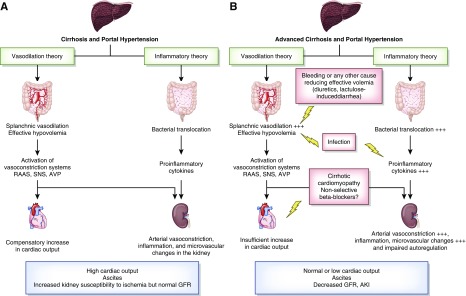Figure 1.
Mechanisms involved in AKI in decompensated cirrhosis. (A) In decompensated cirrhosis, both vasodilation secondary to portal hypertension and systemic inflammation induced by gut bacterial translocation tend to induce kidney arterial vasoconstriction because of the activation of vasoconstrictive systems in response to decreased effective blood volume and inflammation in the kidney inducing microvascular changes. These changes result in a hyperdynamic state characterized by increased cardiac output, ascites, and normal GFR, but increase susceptibility of the kidney to AKI. (B) The onset of hepatorenal syndrome corresponds to the most advanced stages of these changes, with an intense kidney vasoconstriction and impaired kidney autoregulation leading to a decrease in GFR. Any event further decreasing hypovolemia (bleeding, diuretics overdose, lactulose-induced diarrhea), decreased cardiac output (e.g., cirrhotic cardiomyopathy, nonselective β-blockers) or systemic inflammation, with or without over sepsis, can precipitate hepatorenal syndrome. AVP, arginine vasopressin; RAAS, renin-angiotensin-aldosterone system; SNS, sympathetic nervous system.

